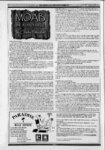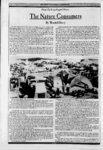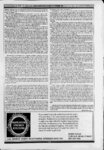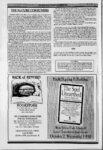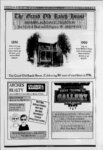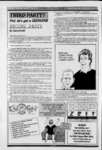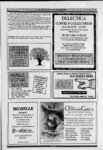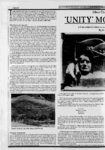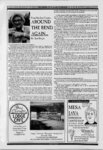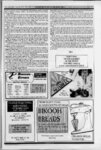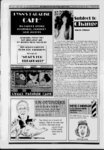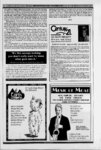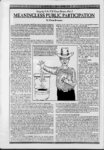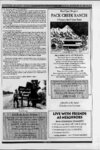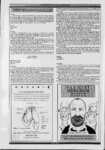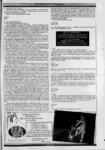| OCR Text |
Show F highway. There are days when the river will not grow quiet from the wake of one boat before it is disturbed again by the passing of another, and these boats frequently travel in groups of a dozen or two. The episodes that begin these notes are not typical of the behavior of vacationers on this river. But I think that they are symptomatic, and that they clarify same of the meanings of the boating phenomenon, and I am disturbed by what I think those meanings are. The generalization that the activities of the boatmen tend to support is that, in relation to the natural world, the pleasure of Americans can be destructive in die same way that their work has already proved to be. It is not, certainty, a conscious destructiveness. But in that very unconsciousness it becomes an aspect of one of our worst national failings: our refusal to admit the need to be conscious. Or to put it more meaningfully: our refusal to admit that unconsciousness, in our time, is almost inevitably destructive. The destructiveness of the boatmen is of a peculiarly modem kind. It is essentially the same as the destructiveness of certain industries, and it has the same causes: the use of powerful machines, and the discarding of more or less imperishable refuse. The destructiveness of the boatmen differs from that of industry mainty in the sad paradox that the boatmen destroy what they supposedly want to keep. They do not intend to exploit or damage anything. They have come to enjoy the river-an-d their enjoyment of it damages not do a as fisherman use uses it, leaving it as it was; they use it as clothing is it it They used, leaving it always a little worse for the wear. They are foe consumers of the river. The aspect of this destructiveness that has attracted most attention, and has finally become the object of a state law, is the dumping of trash into foe water. Of aU the boating offenses this is certainly the most noticeable, and in many ways it is the most disgusting. An amount of trash that would be a relatively minor eyesore on a highway will deface the river for miles, carried and dispersed on the currents. One Fourth of July, while we ate a picnic on the riverbank, we watched a procession of bottles and cans and wadded papers from a lunch being served on a boat a few hundred yards up foe shore. That sort of thing can give the open country a feeling of almost urban crowdedness. Much of the refuse that gets into the river is, of course, thrown in from the shores, and washed out of dumps by high water. But there is some that is just as certainly attributable to the boatmen. I have seen, for instance, whole table settings of paper and plastic dishes floating along together. There is another concem-becaus- e it has apparently received no attention, and because I am not a scientist-- 1 can express only as a question: What effect is the turbulence of all this traffic having on the banks of the rivet? Of a wide river with gently sloping low banks this question would probably not need to be asked. But the Kentucky is narrow as navigable rivers go, its banks are high and extremely steep, and they are often composed largely of sand. Along such banks there will naturally be a continuous wearing by the current, but I think there is a reason to suspect that this natural erosion is now being hastened by the wake of the boats. The waves particularly of the larger boats strike with great force, leaving the water muddy and the wetted banks more vulnerable to the wake of the next boat Some of the wearing in the banks seems dearly to have been caused by the lateral action of the waves rather than by the longitudinal flowing of the current. And there is some crumbling to be seen along the banks in the times of low water, when there is no current but a heavy traffic of boats. Officials in the Frankfort have told me that no consideration is being given to this problem. In view of the likelihood that the number of pleasure boats will increase steadily for a long time, it seems to me that some consideration should be given to it. This worry is hardly a part of the boatman's experience. Speeding along, he has before him a tranquil river scene, peaceful and entidng as if pictured in a tourist brochure. When the shores begin to chum and the water to cloud with mud from the violence of his passing, he is not there. But not only are the holiday boatmen often careless of the monopolize it There is no such thing, apparently, as a slow pleasure boat. Even the large, awkwardly shaped houseboats are customarily equipped with powerful engines that send them along at cruiser speeds. When these boats take to the river in weekend numbers the pleasure of motorboating becomes the only possible pleasure. The use of a rowboat is possible, but hardly pleasant; canoeing can even be dangerous. Fishing, from a boat tossing and beating in the turbulence a cabin cruiser can stir up in a narrow stream, is simply impossible. Out on the river in a canoe or rowboat, it would be dangerous to act on the assumption that any approaching motorboat will do the common courtesy of slowing down. It is rare that one will do it. And even courtesy is curiously thwarted by the fact that foe violence of the wake of some boats increases as they slow down. From the confluence of its headwater streams at BeattyviOe to its mouth at Carrollton, the Kentucky River is 255 miles long. On a summer holiday this much river could accommodate many hundreds of canoes and rowboats and fishermen and swimmers, who miiM share it quietly and in some isolation from one anofoer-thquiet and the isolation being, I assume, the reasons one would go to a river instead of an amusement park. But a hundred or so of these fast motorboats, evenly distributed over foe length of so narrow a river, will produce foe effect of crowdedness, fill it with noise, and substantially reduce river-the- y e the pleasure and the safety of everybody else. But suppose that the river is used not by a hundred of these boats but by several and holidays. Suppose that some of these boats hundred, as it is on summer week-end-s are broadcasting music or talk over amplifiers, as some da Suppose some of them carry with rifles, as they frequently da It will be seen on their decks men and boys then, I think, what a disproportionate share of the good of the river is taken by them. It is not that the boatmen want to take so much. It is maybe more troubling to reflect that they take it automatically, thoughtlessly, simply because they go fast and make so much commotion. There is another destructiveness involved in this sport that is less easy to understand, but that once explained may help to explain the rest The use of these fast and powerful boats is not only destructive of the river and of the pleasure of other people; there is a sense, it seems to me, in which it is destructive of the pleasure of the boatmen themselves. I know that if one of these men were asked to justify his sport he would certainty say that there is pleasure in the ownership and use of a fine boat, and that there is a pleasure in speed. I would agree Some of those boats are Indeed beautifully made; I understand the satisfaction there would be in the maintenance and use of one And I also am a creature of the time and know the pleasure of going fast. But then another question is suggested: If the handling and speed of the boat are the pleasures sought, then why should these people not be content to go round and round or course near their dock? Why should boatmen from Cincinnati up and down on a and Louisville, who have the wide Ohio to maneuver on, come to a comparatively remote stream like the Kentucky that is narrower, crookeder and more difficult? The only answer I can think of involves another pathetic paradox. They come in search of peace ad quiet, solitude, some restorative contact with the natural world. Which is a little like going in search of a forest with a logging crew. Once they have got it, they have lost it. They come to seek the stillness of a natural place, and their way of seeking assures the failure of their search. They seek relief from restlessness and anxiety in these expensive, fast; superhorsepowered boats, which are embodiments of restlessness and anxiety. They can never arrive. They go to foe country to rest; only to reproduce there the noise, haste, confusion-and- , surely, the frustratkm-o- f city traffic The boatman's pursuit of pleasure is determined and limited not by his and his family's need but by the size and speed of his boat, and so he takes far more than he needs. It may be that he actually gets las pleasure because of taking so much. And the excess of his pleasure, useless to hint, is useless to everybody else. Because he takes too much, he creates the possibility that others will have too little. The boatman, then, has become what is to say, a more and more seems the ideal man of our society: a superconsumer-whic- h "the benefit burden the world. to to a a a waster, miner, economy," The mentality that could support delusions so damaging to itself is strange to the world, alien to creation. It is like a dog that, chasing its own tail, catches it and bites it off It is both a kind of madness and a kind of unconsciousness, so impenetrable by reason that I could not articulate the questions it raises, much less find answers, until I began to reflect on the two statements of the boatman quoted in the first of these notes. We didn't know anybody lived around here. They had come, one must suppose, in answer to the summons, still much alive in America, that brought some men to foe frontier, the attraction of a wild, uninhabited place. And the high wooded banks of this river had permitted an illusion that would have been dissipated by a glance at a road map, or even a moment's thought AU of Kentucky is inhabited now. The settlements have grown here for nearly two hundred years. The wild country is gone, along with the Indians and the buffalo and the wolves and the elk and the passenger pigeons and the parakeets and nearly all the oki forests and much of the fertility of the land. Kentucky is inhabited all right, and for foe most part the inhabitants have treated it as if it were uninhabited, or soon would pot-shooti- ten-mi- le be. We're on the river, you know. He meant, of course, that he was in a public place, not my place, and so I had no right to complain. But I think he meant more than that A wild, uninhabited place, such as he wanted to believe he had come to, is by definition of our frontier experience a fra place One has no bosses there, one is free of responsibility and can do purely according to pleasure. How illusory that is is proved by the fact that the country is inhabited and that some of the inhabitants objected to anyone's behaving as if it were not How illusory it is, and how dangerous, is proved by American history. Those pioneer forebears of ours, so attractively free of responsibility, not only settled the country but also used up the fertility and wealth and beauty of it at a rate that made their lives a disgrace to them and a burden to us. It la invariably damaging when men with neighbors act on the assumption that they are alone. And we are seeing with greater clarity and sorrow every day that the most solitary have had neighbors, and that the loneliest have had heirs. What has troubled me most and longest is that these people, having come within reach of the decent harmless restorative pleasures that I know to be possible here, are oblivious to them, as remote from them as if they were looking at panoramic shots of the valley on a movie screen. coatuncd os scxt pag-e- need to supply water beyond the reach of power lines, then solar power can solve the If you problem. Photovoltaic powered pumps provide a welcome alternative to engines, windmills, and hand pumps. Thousands of solar pumps are working throughout the world. They produce best during sunny weather, when the fuel-burni- SCIRERIORteSS SM SYSTEMS need for water Is ng greatest. ROBERT SOLDAT CVSR2510 MOAB.UT 84532 CALL SUPERIOR ENERGY, SOLAR PUMPING EXPERIENCE SINCE 1987. (801)259-763- 8 |



